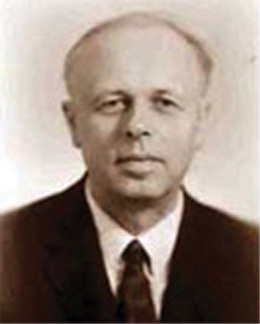December 14, 1989: Death of Andrei Sakharov
 |
Andrei Sakharov was a Soviet scientist who started out as a weapons researcher and became, in the words of the Nobel Peace Committee, a "spokesman for the conscience of mankind."
A brilliant physicist who was fascinated by fundamental physics and cosmology, he first spent two decades designing nuclear weapons, becoming known as the father of the Soviet hydrogen bomb, contributing greatly to the military might of the USSR.
Gradually, however, he became one of the regime's most courageous critics, an internationally renowned defender of human rights and democracy.
Born in May 1921 into a Moscow family of cultured and liberal intelligentsia, Sakharov studied physics at Moscow State University and was quickly recognized as a brilliant student.
He was exempted from military service during World War II and completed his studies in 1942.
For several years he worked as an engineer at an armament factory, patenting several inventions, and when the war ended he was recruited into the top-secret nuclear weapons project.
In 1957, concerned about the radioactive hazards of nuclear testing, Sakharov wrote a pioneering article about the effects of low-level radiation, thus embarking on his long career of civic-minded dissent.
In 1964, he and 24 other prominent intellectuals and artists wrote to Brezhnev, warning the Soviet leader against the rehabilitation of Stalin, and in 1968 he emerged dramatically as an inspiration to the human-rights movement with an essay entitled, "Reflection on Progress, Coexistence and Intellectual Freedom," which was published in The New York Times. It was a scathing indictment of the Soviet totalitarian system, urged the end of the cold war, and set forth a constructive blueprint for remaking the Soviet Union and the world.
This was the first public appearance of the "Sakharov doctrine", espousing the indivisibility of human rights and international security. As a result, he was fired from the Soviet weapons program.
Sakharov's outspokenness also prompted a Soviet vilification campaign. Open letters were published denouncing him, some signed by members of the Soviet Academy of Science, in which he was branded "a Judas" and "laboratory rat of the West," among other epithets. Despite his frustration with attempting to influence the Soviet establishment from within, his advocacy of human rights and defense of prisoners of conscience earned him the Nobel Peace Prize in 1975.
The citation called him "the conscience of mankind" and said that he had "fought not only against the abuse of power and violations of human dignity in all its forms, but has in equal vigor fought for the ideal of a state founded on the principle of justice for all."
He was denied a visa to travel to Norway to accept the award; instead his wife, in Italy for eye surgery, accepted on his behalf.
In the years that followed, Sakharov continued to develop what would become the intellectual framework for the political, economic and legal reforms of perestroika, making forceful statements criticizing continued human rights violations and calling for the release of prisoners of conscience.
Although this won him international respect, Soviet authorities were losing patience. When he denounced the military intervention in Afghanistan in December of 1979, the Kremlin's response was quick. Not daring to arrest him, the Soviet Politburo instead detained him on the street on January 22, 1980, and forcibly banished him to Gorky, 250 miles east of Moscow.
He was never charged, tried before a court of law, or convicted. During his nearly seven-year exile, Sakharov received invaluable support from American physicists, who sent him reprints of their scientific articles and campaigned in the media in his defense. He also worked on his autobiographical memoirs, which he had to rewrite three times to restore what was stolen by the KGB.
The dark clouds began to lift in December 1986, when Mikhail Gorbachev invited Sakharov to return to Moscow to perform "patriotic work." He was elected to the Presidium of the Academy of Science and to the Congress of People's Deputies, and was appointed a member of the government commission to draft a new Soviet Constitution.
In June 1989, at the First Congress of People's Deputies, Sakharov called for a radical reformation of the Soviet system and for an end to the Communist Party's dictatorship.
Just a few days before his death on December 14, 1989, he completed a draft of a new constitution for the "Union of Soviet Republics of Europe and Asia." He suffered a sudden heart attack while preparing for a contentious meeting the next day and told his wife, "Tomorrow will be a battle." Returning to check on him a short time later, she found his body.
Although he was a free man for less than three years following his exile, Sakharov lived long enough to see the totalitarian colossus begin to crumble.
He witnessed the fall of the Berlin wall and the beginning of irreversible changes that swept through Russia. He also saw his ideas, and steadfast dedication to truth and justice, shared by thousands of his fellow Russians.
©1995 - 2024, AMERICAN PHYSICAL SOCIETY
APS encourages the redistribution of the materials included in this newspaper provided that attribution to the source is noted and the materials are not truncated or changed.
Associate Editor: Jennifer Ouellette
December 2002 (Volume 11, Number 12)
Articles in this Issue

